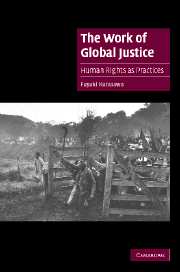Crossref Citations
This Book has been
cited by the following publications. This list is generated based on data provided by Crossref.
Beck, Ulrich
2007.
Beyond class and nation: reframing social inequalities in a globalizing world1.
The British Journal of Sociology,
Vol. 58,
Issue. 4,
p.
679.
Somers, Margaret R.
and
Roberts, Christopher N.J.
2008.
Toward a New Sociology of Rights: A Genealogy of “Buried Bodies” of Citizenship and Human Rights.
Annual Review of Law and Social Science,
Vol. 4,
Issue. 1,
p.
385.
Poferl, Angelika
2010.
Fragile Sozialität.
p.
143.
De Luca, Adam
2010.
Review Essay– Fuyuki Kurasawa's, The Work of Global Justice: Human Rights as Practices (2007) - [Fuyuki Kurasawa, The Work of Global Justice – Human Rights as Practices (Cambridge University Press, 2007); ISBN: 9780521673914; 256 pp.; $31.99 Paperback].
German Law Journal,
Vol. 11,
Issue. 4,
p.
457.
Zilbershats, Yaffa
2010.
Sovereign States Control of Immigration: A Global Justice Perspective.
Israel Law Review,
Vol. 43,
Issue. 1,
p.
126.
Tazreiter, Claudia
2010.
Local to Global Activism: The Movement to Protect the Rights of Refugees and Asylum Seekers.
Social Movement Studies,
Vol. 9,
Issue. 2,
p.
201.
Beck, Ulrich
and
Grande, Edgar
2010.
Varieties of second modernity: the cosmopolitan turn in social and political theory and research.
The British Journal of Sociology,
Vol. 61,
Issue. 3,
p.
409.
Scully, Pamela
2011.
Zoë Wicomb, Cosmopolitanism, and the Making and Unmaking of History.
Safundi,
Vol. 12,
Issue. 3-4,
p.
299.
Rios, Francisco
and
Markus, Susan
2011.
Multicultural Education as a Human Right: Framing Multicultural Education for Citizenship in a Global Age.
Multicultural Education Review,
Vol. 3,
Issue. 2,
p.
1.
Collins, Dana
and
Talcott, Molly
2011.
‘A New Language that Speaks of Change Just As It Steps Toward It’: Transnationalism, Erotic Justice and Queer Human Rights Praxis.
Sociology Compass,
Vol. 5,
Issue. 7,
p.
576.
KELLY, TOBIAS
2011.
The cause of human rights: doubts about torture, law, and ethics at the United Nations.
Journal of the Royal Anthropological Institute,
Vol. 17,
Issue. 4,
p.
728.
2012.
The Wiley‐Blackwell Companion to Political Sociology.
p.
491.
Roberge, Jonathan
2012.
De la critique culturelle dans la société civile globale. La part des mouvements sociaux, des médiacultures et des crises humanitaires.
Sociologie et sociétés,
Vol. 44,
Issue. 1,
p.
61.
Beck, Ulrich
2012.
Une sociologie cosmopolite : esquisse d’un changement paradigmatique.
Nouvelles perspectives en sciences sociales,
Vol. 8,
Issue. 1,
p.
161.
Johnstone, Gerry
and
Quirk, Joel
2012.
Repairing Historical Wrongs.
Social & Legal Studies,
Vol. 21,
Issue. 2,
p.
155.
Kurasawa, Fuyuki
2012.
L’humanitaire, manifestation du cosmopolitisme ?.
Sociologie et sociétés,
Vol. 44,
Issue. 1,
p.
217.
Nash, Kate
2012.
Human Rights, Movements and Law: On Not Researching Legitimacy.
Sociology,
Vol. 46,
Issue. 5,
p.
797.
Dufour, Frederick Guillaume
2012.
Marx et la tradition cosmopolite : l’actualité d’une tension.
Sociologie et sociétés,
Vol. 44,
Issue. 1,
p.
103.
Chase, Anthony Tirado
2012.
Legitimizing Human Rights: Beyond Mythical Foundations and Into Everyday Resonances.
Journal of Human Rights,
Vol. 11,
Issue. 4,
p.
505.
Poferl, Angelika
2012.
Emotionen, Sozialstruktur und Moderne.
p.
279.



